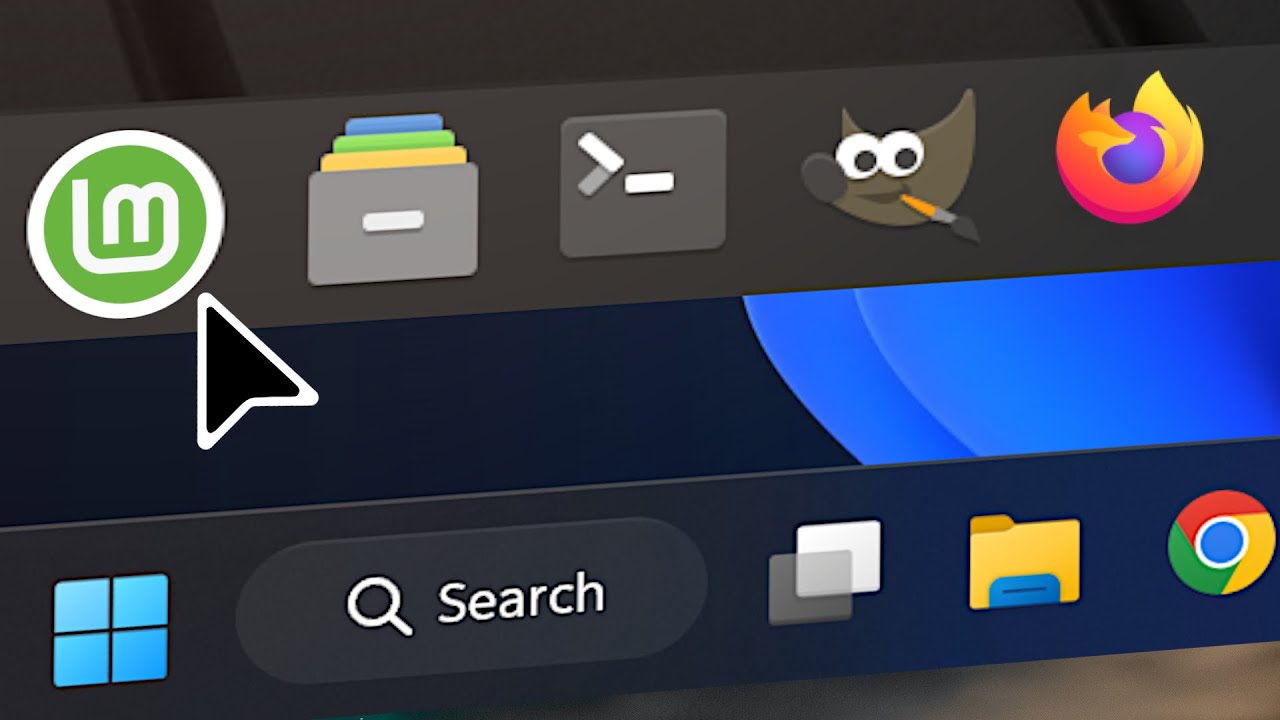TLDW of this video from ChatGPT
The video highlights the following main points about why Linux Mint is considered better than Windows 11:
-
Start Menu and Customization: Linux Mint’s menu is more organized and customizable than Windows 11’s start menu. It offers three columns, resizable icons, and customizable labels.
-
Taskbar (Panel) Features: Linux Mint’s panel is more flexible, allowing repositioning, resizing, and creation of additional panels. Applets enhance functionality, offering features like quick desktop access and window behavior customization.
-
Privacy and Telemetry: Linux Mint is privacy-focused, avoiding telemetry. Certain apps’ telemetry can be manually disabled. Windows 11 is criticized for lacking privacy.
-
Bloatware and Pre-installed Apps: Linux Mint has minimal bloatware, including useful tools or open-source alternatives. Windows 11 can have cluttered start menus with unwanted icons.
-
Batch File Renaming and Management: Linux Mint’s file management includes advanced batch renaming with insertion, removal, and case conversion. Windows 11 lacks similar features.
-
Security (Future Topic): Security is mentioned as a potential future topic, with Linux Mint considered more privacy-oriented than Windows 11. Discussions about security are acknowledged.
The narrator encourages viewer engagement and discussion on the covered topics.
“Objectively”: Proceeds to give his opinion
I thought it would be about ram/disk usage and how they display colours
Or how on Linux you can bypass the cpu for instructions
deleted by creator
“I switched to Linux today, my life is completely different!”
And every single one will be met with “I spend 80% of my pc time gaming, my games don’t run in linux as good as windows, end of discussion”.
Also, comparing stuff to windows 11 is quite the low bar, 2 of those points don’t apply to win10 and the 5th can be done with powershell and wsl1.0 afaik pretty fast. the 5th can be done in windows by running a python script too, and let’s be honest, what is the use case of batch file renaming if it’s not for programming? it’s not a common issue.
So basically, it’s about privacy, bloatware and security. Bloatware can be uninstalled if you are a power user, and let’s be honest normal users won’t even dream about using linux.
So yeah. I love it for work but it’s lacking for my entertainment pc.
I’ve actually found the opposite, thanks to the lack of all the windows shit on my pc games seem to run smoother. I’ve had one game not run out of the box so far and I’ve played a fair few with either my PC or steam deck so far
That said I don’t play that many competitive games and I’ve heard their anticheats often prevent them from running on Linux
I’ve had two not run over a few years of buying stuff randomly from steam. All I had to do to make them work was figure out how to bypass a stupid “launcher” that exists only to show you ads.
Games with launchers do kinda suck yeah usually there’s a workaround though
To make a list: Path of Exile has given me big issues, graphical errors, and weird stuff happening and the game is already demanding enough for emulation inneficiencies to worsen it.
About all of the windows shit on your pc, idk, remove it? You can remove/stop tons of windows services, uninstall all the Microsoft crap, close and disable cortana… You either play indie games that don’t require much optimization or semi old games that have had tons of work by the proton team already done. However, love service games are getting constantly updated and improved, for windows, which breaks the emulation efficiencies and need constant maintenance.
I’ve had issues with Legue of Legends too, and it really sucks when the game closes in the middle of a match.
Voice processing programs like nvidia broadcast have no Linux runtime, and they are a godsend to filter both my shitty microphone and my friends’, and no discords shitty filter doesn’t work that well at all.
“game ready” drivers where nvidia optimizers the drives so that the new hot games run better, don’t exist for Linux.
When you say “all the windows shit”, I can’t really relate since I just open the process manager if anything is running weird, check the services running it, investigate and stop it. I had to do this once or twice in all the years I’ve been using Windows, but strange graphical errors happen quite a lot in Linux. Witcher 3 had some really weird things ha penning when I tried it on Linux.
As a reference, I had a ryzen 1700 and a gtx 1080 when I tested most of those games. 16gb of ram and 500GB of ssd, and games obviously on the ssd.
I could go on, but I think that I’ve already made my point.
The game ready drivers I hadn’t considered, that said I’ve still not had an issue running newer games. Ran diablo 4 flawlessly on high settings on linux with an Nvidia card
Nvidia broadcast is good but Krisp and noisetorch are perfectly good too I think
You’re talking about emulation, I’m assuming you mean wine/proton and not just trying to game in a VM. LoL I can understand being a competitive game, I’m kinda confused by path of exile looks like an old single player game
I have exclusively played witcher 3 on my steam deck and it ran flawlessly, maybe it was something to do with your distro/setup?
As for the windows shit sure I could go through every process in task manager disabling things and fighting windows (you can’t get rid of cortana without digging deep into your system for example) but Linux comes free of all that crap out of the box and doesn’t make me run around removing stuff from my system
(Also, I am the worst for not uninstalling things ever but now I’m on NixOS I basically just remove everything I don’t need anymore from the config file and it’s gone)
Out of curiosity, when did you last try gaming on Linux and on what distro?
Yeah, ofc I’m talking about wine/proton, proton is wine+ and wine is an emulator whose name translates to Wine Is Not an Emulator, funny. PoE is not an old game at all, and it’s quite hardware demanding, the leader of the non casual ARPG market.
Krisp and noisetorch are perfectly good too
Sadly, krisp can’t even compare to the level of noise reduction I get from broadcast/rtxvoice, it completely eliminates annoying sounds (dogs barking, fan noise, random high pitched shouts from annoying friends. I can even even rub my beard to the mic while talking and what others hear is just a slight distortion in my voice. I have not tried noisetorch so I don’t know, but I would be very surprised if they get the level of reduction that I have from nvidia.
The last time I played with linux was about 3ish years ago. I might install linux on my old SSD when I upgrade my pc and get new drives, just to have dual boot to test stuff without fear of breaking anything (it’s nbd to create partitions and to expand a drive and all that stuff, but it feels like working at home), but lutrix and/or proton were already running quite high and mighty when I tried.
There’s other stuff too, although this is quite minor, the propietary programs to control the lighting of my keyboard/mouse are not on linux, and those are VERY important (/s).
it’s not that I’m viscerally against linux, it’s just the reaction i get from the lemmy linux evangelists :sweat_smile:
It’s come a ridiculously long way for gaming in the last 3 years thanks to the steam deck’s popularity
Depending on your peripherals I believe there are open source alternatives for RGB, pretty sure someone’s made an icue one
Path of exile was released in 2013 (10 years ago, sorry to make you feel old lol
Pretty sure wine is more of a translation layer than an emulator hence the name
Sure, as stated (or maybe it was another chain) I’ll test stuff when I upgrade the mobo, and with it add new m2 cards for extra space.
About PoE, that’s not really a good metric since the game is being updated constantly with extra content and graphical improvements. You wouldn’t really say League of Legends is old, right? It’s from 2009 though.
About wine… Emulators are command/operation/api translators lol.
I use batch renaming all the time, very little of it for programming. Media management, and general file organization are my most common uses. But there are plenty of third party free programs that let windows do this without the need for running python scripts.
Yep like the semi official powertoys.
I mean imo everything about Windows is terrible. But I don’t think you’re going to win (lol) anyone over with debates, at least no one who doesn’t already complain about Windows. I think the main reasons people use Windows are:
- Ubiquity (they use it at work, at the library, and at home)
- Familiarity (it’s what they grew up with)
- Barrier to entry (the average person doesn’t have to install windows. And even if they do it’s a lot less painful than installing a Linux distro)
- Gaming (this is sliding a little bit but many many people still install windows on a homebrew tower specifically for gaming)
Ubiquity will have a hard time changing as long as Microsoft continues to bastardize their own products for the sake of B2B relationships. Familiarity is a chance of history so that’s kinda up to you to get your kids into what you like. Barrier to entry is a systemic issue with the Linux and FOSS communities at large and I genuinely don’t see this changing anytime soon (and I’m not just speaking culturally although that’s an issue too). And gaming, well we all know the Linux gaming community has been slowly but steadily growing for a while now, cue the steamdeck enjoyers
For a lot of normal people linux just doesnt offer any advantages they care about. If you tell them it can do everything windows can do, the question “so why should i go through the effort of switching” remains. There’d have to be something they really want, that they can’t get from windows.
Though average users use mobile devices instead of desktops more and more, so I can see windows becoming mostly a thing that people use at work.Ya it’s hard to sell it to someone when the conversation is basically “well if you spend several hours learning all of these tools then you can get it working the way your windows box works… Kinda”
Yeah I experienced it this week personally. I’m like, ‘Let’s give Linux a shot!’ So I throw on Elementary OS, dive in, and spend a good hour jazzing things up. Boom, I’ve got my regular Windows apps running no problem, and I’m patting myself on the back. Fast forward: I’m all set to do my Windows routine on Elementary, but guess what’s missing? My fancy Microsoft work tools, my go-to online games, and oh, all those cool accessories I collected that just won’t work. Time to wave the white flag and head back to Windows town, I guess
I mean imo everything about the windows is terrible.
Maybe that’s very subjective but I find that thought very hyperbolic. Windows generally is pretty good and for example have some nice features like complete system reset while preserving your files. Windows has some issues but so does Linux.
I only use Linux on my gaming+work laptop because I enjoy the freedom and I feel Windows is overly intricate and more and more “commercial” but Linux has its rough edges.
- Adobe software. Honestly they work, and work well.
I love Linux, but I do generally consider it a special-purpose OS. Servers, embedded stuff, etc, I will always go with some flavour of Linux.
But for a daily driver I do struggle imagining using anything other than Windows. Like sure, I could probably get all my games and CAD software working in a Linux OS. But I can easily grab Win10 LTSB and have everything just work. I have to make a living from my machine, and ultimately I just need it to work.
If I was doing just web and office work, then it would be no harder really, but I’ve finally accepted that not everything should be a project!
CAD software
Well, not really. I couldn’t get anything other than FreeCAD/LibreCAD to work on Linux. Blender is supposed to work but it gave me nothing but issues.
Here is an alternative Piped link(s): https://piped.video/watch?v=5uY3u_xZDL0
Piped is a privacy-respecting open-source alternative frontend to YouTube.
I’m open-source, check me out at GitHub.
Point 4 is only true if you buy a pre built system. If you install the OS yourself there is very little pre installed.
What you’re seeing in the Video is pretty much what the start menu will look like after a clean install of Windows 11, minus Audacity and Chrome.
I suppose it depends on your definition of “very little” but I would say that for most Linux users, “Windows 11 can have cluttered start menus with unwanted icons” is definitely accurate.
I did a fresh install of Windows 11 Home the other day and it had at least 10 apps that I manually removed right off the bat. Stuff like WhatsApp, Instagram, Facebook Messenger, One Note, Xbox Live and a few freebie games were sitting front and center in the start menu, even though I had not agreed to have any of them installed.
Majority of people are buying prebuilt systems or laptops though.
This is really nice. I’ve been using Mint for years and didn’t know about it.
Security (Future Topic): Security is mentioned as a potential future topic, with Linux Mint considered more privacy-oriented than Windows 11. Discussions about security are acknowledged.
Is Wayland support finally actively worked on, or is it still postponed?
According to a recent announcement by one of the devs:
We also want to spend time on studying the pros and cons of Wayland and to assess the work needed in its potential adoption.
In other words, they haven’t even started yet.
I think they are taking a careful approach since there are still apps out there that don’t work on Wayland. For example TeamViewer.
Personally I don’t mind if they take their time to evaluate it, try it and see how best to integrate it. Rather than just rush in and break a whole lot of stuff.
I don’t think the “some apps don’t work with Wayland” argument is particularly valid any more. The vast majority do, and most of those that don’t are outdated anyway. Gnome ships with it by default and KDE is really close to that point as well.
There really shouldn’t need to be any debate whether to implement it or not at this point- clinging on to X11 is just delaying the inevitable.
Big yikes. In that case, I wouldn’t recommend Mint to beginners at all. Alone, the whole Sandbox concept of Flatpak needs Wayland to work properly. Wayland is the future, regardless if you like it or not.
Agreed. I actually think Pop OS and Nobara are the best beginner distros right now. Mint is falling a bit behind the times.
I like the idea of Nobara but I’m scared of recommending it because of the Fedora telemetry stuff. Considering GE is a RedHat employee, I don’t think he would disable Fedora’s telemetry in Nobara.
This might not be the most popular take, but IMO the fuss about Fedora’s (proposed) telemetry is way overblown. By all accounts, it seems intended to help the dev team improve OS performance and will still preserve user privacy.
People tend to lump all telemetry together but Fedora’s implementation would be significantly less concerning than that which users of Android, Windows and Apple OSs currently put up with on a daily basis.
While true, the fact that this was proposed by RedHat engineers combined with the fact that RH employs some of the upper echelons of Fedora members, thus having quite some control over Fedora as a project makes me distrust parts of it. Someone like Matthew Miller seems trustworthy, but you can never be sure. And I think thag if this is accepted, it should NOT be implemented in Nobara, because even from the pro-telemetry perspective, it is still harmful, as it skews analytics significantly.
I’m not familiar with your last point - what analytics does it skew and how?
If it’s not opt in, it’s spyware.
There is literally no data generated by my machine that you can take without me making an active choice to give it to you without being a bad human being. It is not your data. It’s mine. There are zero exceptions.
There is exactly one valid way to collect user data. You ask permission, with precise details on how you intend to use it and how you will anonymize it. Then you respect the answer.
There is vast ocean of difference between collecting non-personalized, aggregate data internally to inform UI design decisions or improve system performance on the one hand and secretly logging personal information in order to pass on or sell to third parties on the other.
I agree. A lot of people went over the discussion to voice their opinions. And the proposers have adapted it since. They listen to their users, contrary to other for-profit operating systems (to reiterate, Fedora is NOT for-profit, and it never has been)
Literally none of those are actually"objective"…
I have tried lots of distros yet I am always going back to Windows.
I found my inner peace after installing debian as my daily driver and windows 11 on my laptop mainly for programming/gamedev stuff.
After Gnome 42, I can never go back to Windows on my laptop. I don’t know if you’ve tried it since then, but the finger navigate gestures are really good.
Huh, I’m honestly shocked Mint is still a thing. It screwed me over so bad many years ago, I’ve been Windows ever since.
Would you take someone complaining about being “screwed over” by Windows XP seriously? Your complaint about Mint falls into the same category.
I’m not trying to convince you of anything. I was genuinely shocked that Linux Mint is still around. Haven’t heard about it in years. You’re free to not take that personal.
You made a completely uniformed statement as if it was still valid. You’re free to take the fact you were called out on it personally.
Fact: I’m shocked Linux Mint is still a thing. Fact: it screwed me over in the past. I don’t see how either of those statements can, by definition, be uninformed or not still valid. What are you trying to prove? I don’t need you to validate my life experiences. Why are you acting like you need me to validate your life choices?
I don’t need you to validate my life experiences.
LOL! Apparently you do.
Elaborate?
Details are fuzzy at this point, but I believe it was a series of updates that kept having issues and finally one update that completely screwed up the machine, and in trying to fix it I ended up losing some important data. I was pissed off and got an MS Surface, and I kind of loved it, so haven’t been Linux since.
He’s referring to Mint gum. He choked on it.
ChatGPT can summarize youtube videos?
I also want to know this
Extract the video subtitles and paste it to ChatGPT and ask your questions.
Considering the average quality of auto subtitles, this looks like feeding crap inputs to an already “unreliable” AI.
deleted by creator
Thats wicked smart
Well, not sure if the best way to do it, hehe, but could be the only way I can imagine.
I recently learned that Bard can also “view” YouTube videos, I asked it to summarize this one and this is what it said - I noticed it’s a bit different from OP’s, though I haven’t yet watched the video myself to confirm the accuracy of this one specifically.
Ok. Now, change the audio bit rate in the GUI? You can try any Linux you like.
The Lack of functions in the GUI to configure Hardware devices is a serious problem for Linux. You can’t Configure anything on your AMD graphics card, set sleep timeout of you wireless game controller, or enable HDR.
I’m currently having a good time in Arch but I’m frustrated that GUI controls for basic stuff is still missing. Most of this stuff has been in Windows for decades.
Rather focusing on the how customisable the desktop environment is, they need to focus on making Hardware configuration easier.
Agreed. Last time I used my Wacom tablet on a Linux station, I had to type a bunch of commands every start up to get it to work in the correct aspect ratio because there was no GUI tool for that. Surely there’s a way to register that kind of stuff for start up, but why do I have to figure this out ? I just need to get work done. Wacom tablets have been around for 30 years and are used by most of the digital artists out there, it’s not some exotic peripheral. It seems like it should be easier
How DARE you ask about GUI controls! But seriously I’d love to see more of it. It certainly would make on-boarding of windows users much easier. All the CLI functions scare most away. It seems like every time I ask about a GUI for something I get shot down hard. Like I understand why CLI is more prevalent, way easier to troubleshoot and instruct people across multiple distros. But if you want to grow the Linux community, ease of use to the broad public has to become priority, and I think GUIs is the best starting point for that.
And having things built in would be a major help as well, instead of having to see if the software center has it, and then searching GitHub when it doesn’t. Again, I get that some distros might have that, but that would be a niche distro for certain things. A nice GUI tool to adjust GPU parameters would be super (using coolero at the moment), a better audio device manager, gamepad device manager as well, task manager that’s a little more user friendly.
I’m rambling and I don’t want to sound like I dislike Linux. I made Mint my only OS on my laptop and two PCs in my house. I love it. I keep W11 on my gaming PC as a dual boot strictly for VR. That’s all that’s holding me back. I’m fine with CLI tools but I’d reeeeeeally like it if GUI tools became more prevalent.
Agreed. When I went home to put on some music to bang your mom too, it took me like 20 minutes to adjust to the optimal audio bit rate. It totally killed the mood.
deleted by creator
Hey, you can edit config files in GUI 😄
Similar one, try to change mouse acceleration. The last couple distros I had tried were completely lacking any config option for that.
There are already comments about how a GUI isn’t needed or something like that, but Linux will never become remotely mainstream as a consumer OS with that kind of attitude.
As in turn it off or on, or change the curve itself? The option to turn it off or on is in the main Settings -> Mouse and Touchpad page with GNOME 44, labeled “Mouse Acceleration.” Which is, in my opinion, easier than Windows’ obscure Windows 95-style pop-up for “additional mouse settings” and then “enhance pointer precision.”
https://github.com/simonepalmer/pipewire-controller https://github.com/wwmm/easyeffects https://gitlab.freedesktop.org/pipewire/helvum https://kx.studio/Applications:Catia https://github.com/cyber-sushi/pipewire-sample-rate-config https://github.com/rncbc/qpwgraph
The first looks like it does specifically what you mentioned. I haven’t tried any of these except Helvum, and I don’t remember if you can change the bitrate.
I don’t have enough patience (or need) to use a GUI for stuff like this - wpctl is fairly comprehensive - but if it’s something you need to do a lot I get the appeal.
And, I hear what you’re saying about hardware config tools. I maintain a cross-platform monitoring tool, and frequently get requests to support graphics cards; it’s the most troublesome and difficult chore, because these devices all have bespoke APIs, and it’s a PITA to support them - moreso because it’s impossible to test the support when you don’t have access to all of the hardware.
What is this “minimal bloatware” of Mint exactly?
deleted by creator
Compared to windows, not LFS or Arch. Considering it works well on 10 year old devices, either people concerned are using 20 year old hardware, or are a little too paranoid of “bloatware”.
deleted by creator
Probably libre office, honestly can’t name anything else
While it’s already been talked about, for no. 4, does anyone know a good batch renamer I can use with Arch/Gnome?
On Windows I had BulkRenameUtility which was really good.
I think it’s called
bulkeror smth like that
I found it mildly funny reading this, I’ve not been using vanilla windows 10 for quite a while, but have resorted to sticking plasters to get the same effects as mint (start10, fences, and powertoys). It’s very true, out the box all that’s baked into mint, and with the privacy etc.
I heartily miss Mint/Xubuntu, but am cursed with my interests being in game development and audio. :) one of these years…
























